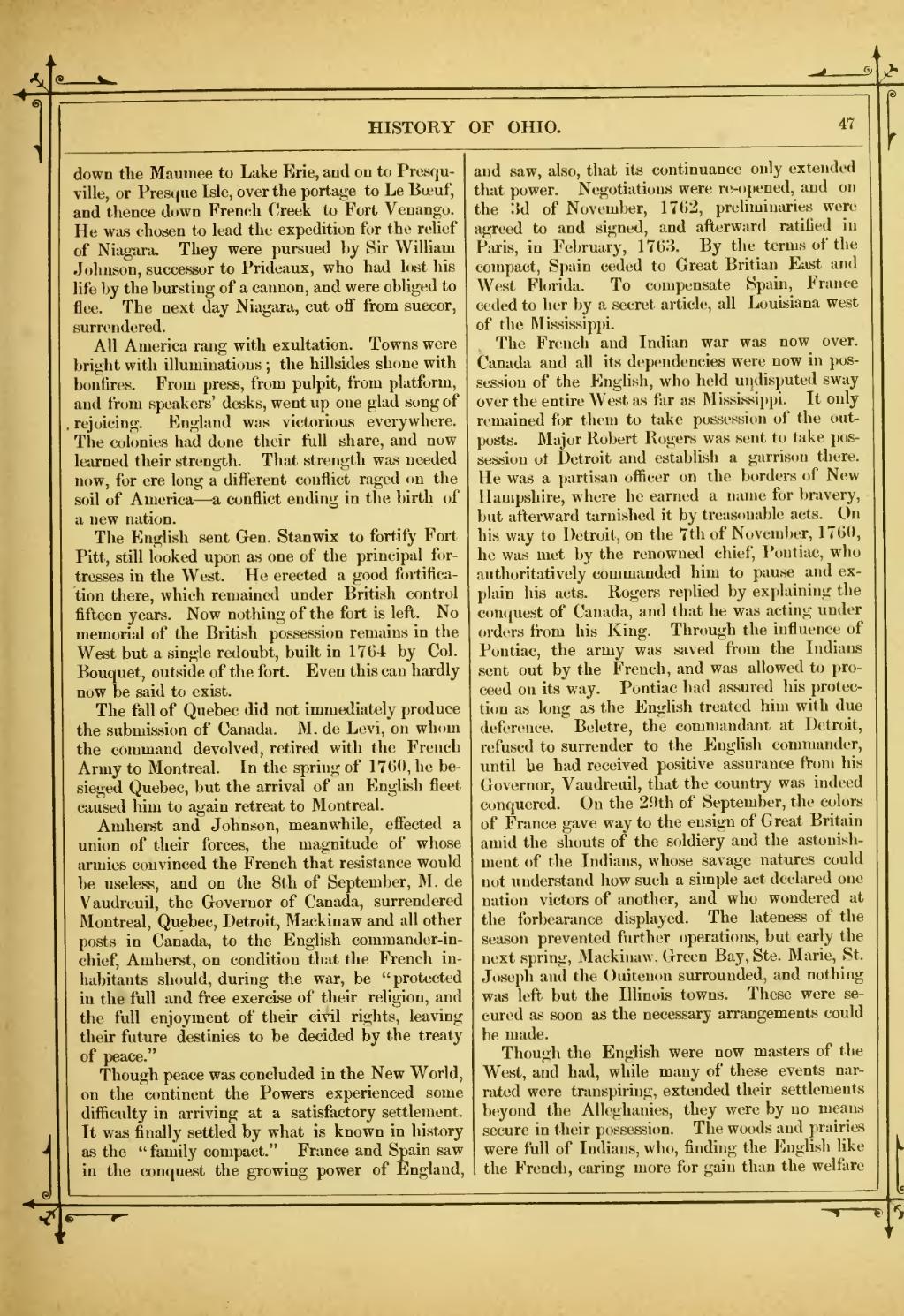HISTOEY OF OHIO.
��47
��^-
��down the Maumee to Lake Erie, and on to Presqu- ville, or Presque Isle, over the portage to Le B(jeuf, and thence down French Creek to Fort Venango. He was chosen to lead the expedition for the relief of Niagara. They were pursued by Sir William Johnson, successor to Prideaux, who had lost his life by the bursting of a cannon, and were obliged to flee. The next day Niagara, cut off from succor, surrendered.
All America rang with exultation. Towns were bright with illuminations ; the hillsides shone with bonfires. From press, from pulpit, from platform, and from speakers' desks, went up one glad song of rejoicing. England was victorious everywhere. The colonies had done their full share, and now learned their strength. That strength was needed now, for ere long a different conflict raged on the soil of America — a conflict ending in the birth of a new nation.
The English sent Gen. Stanwix to fortify Fort Pitt, still looked upon as one of the principal for- tresses in the West. He erected a good fortifica- tion there, which remained under British control fifteen years. Now nothing of the fort is left. No memorial of the British possession remains in the West but a single redoubt, built in 1764 by Col. Bouquet, outside of the fort. Even this can hardly now be said to exist.
The fall of Quebec did not immediately produce the submission of Canada. M. de Levi, on whom the command devolved, retired with the French Army to Montreal. In the spring of 1760, he be- sieged Quebec, but the arrival of an English fleet caused him to again retreat to Montreal.
Amherst and Johnson, meanwhile, effected a union of their forces, the magnitude of whose armies convinced the French that resistance would be useless, and on the 8th of September, M. de Vaudreuil, the Governor of Canada, surrendered Montreal, Quebec, Detroit, Mackinaw and all other posts in Canada, to the English commander-in- chief, Amherst, on condition that the French in- habitants should, during the war, be "protected in the full and free exercise of their religion, and the full enjoyment of their civil rights, leaving their future destinies to be decided by the treaty of peace."
Though peace was concluded in the New World, on the continent the Powers experienced some difficulty in arriving at a satisfactory settlement. It was finally settled by what is known in history as the "family compact." France and Spain saw in the conquest the growing power of England,
��and saw, also, that its continuance only extended that power. Negotiations were re-opened, and on the 3d of November, 1762, preliminaries were agreed to and signed, and afterward ratified in Paris, in February, 1763. By the terms of the compact, Spain ceded to Great Britian East and West Florida. To compensate Spain, France ceded to her by a secret article, all Louisiana west of the Mississippi.
The French and Indian war was now over. Canada and all its dependencies were now in pos- session of the English, who held undisputed sway over the entire West as far as Mississippi. It only remained for them to take possession of the out- posts. Major Robert Rogers was sent to take pos- session ol Detroit and establish a garrison there. He was a partisan officer on the borders of New Hampshire, where he earned a name for bravery, but afterward tarnished it by treasonable acts. On his way to Detroit, on the 7th of November, 1760, he was met by the renowned chief, Pontiac, who authoritatively commanded him to pause and ex- plain his acts. Rogers replied by explaining the conquest of Canada, and that he was acting under orders from his King. Through the influence of Pontiac, the army was saved from the Indians sent out by the French, and was allowed to pro- ceed on its way. Pontiac had assured his protec- tion as long as the English treated him with due deference. Beletre, the commandant at Detroit, refused to surrender to the English commander, until he had received positive assurance from his Governor, Vaudreuil, that the country was indeed conquered. On the 29th of September, the colors of France gave way to the ensign of Great Britain amid the shouts of the soldiery and the astonish- ment of the Indians, whose savage natures could not understand how such a simple act declared one nation victors of another, and who wondered at the forbearance displayed. The lateness of the season prevented further operations, but early the next spring, Mackinaw. Green Bay, Ste. Marie, St. Joseph and the Ouitenon surrounded, and nothing was left but the Illinois towns. These were se- cured as soon as the necessary arrangements could be made.
Though the English were now masters of the West, and had, while many of these events nar- rated were transpiring, extended their settlements beyond the Alleghanies, they were by no means secure in their possession. The woods and prairies were full of Indians, who, finding the English like the French, caring more for gain than the welfare
�� �
